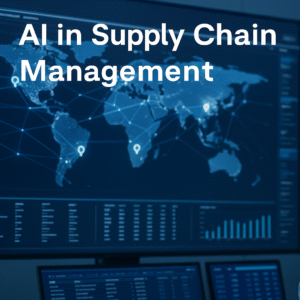The modern supply chain is undergoing a transformative shift, and at the heart of this evolution lies Artificial Intelligence (AI). In today’s highly competitive and volatile global economy, businesses are under immense pressure to deliver products faster, optimise costs, and maintain high levels of transparency. Enter AI in Supply Chain Management — a powerful technological advancement that is helping organisations enhance decision-making, improve efficiency, and foster end-to-end visibility.
In this blog, we delve deep into how AI is reshaping supply chain management, the key benefits it offers, and real-world examples of its applications.
The Need for AI in Supply Chain Management
Traditional supply chain systems often rely heavily on manual processes, historical data, and delayed reporting. These outdated methods can’t keep up with the complexity of today’s interconnected global networks. Furthermore, disruptions like the COVID-19 pandemic, geopolitical tensions, and raw material shortages have highlighted the vulnerabilities in supply chains worldwide.
To remain competitive, companies need agile, proactive, and intelligent systems. This is where AI in Supply Chain Management steps in, providing real-time analytics, predictive capabilities, and automated decision-making that radically enhance performance.
Read More: Future Trends in Operations Management: AI, Automation & Beyond
Key Benefits of AI in Supply Chain Management
1. Demand Forecasting and Inventory Optimisation
AI algorithms can analyse vast amounts of data to predict customer demand with greater accuracy. Machine learning models learn from past patterns, seasonal trends, market behaviour, and even external factors like weather or economic indicators. This enables businesses to reduce overstocking or understocking issues.
As a result, companies can maintain optimal inventory levels, reduce holding costs, and minimise waste — ultimately improving customer satisfaction and profitability.
2. Real-Time Supply Chain Visibility
One of the major advantages of implementing AI in Supply Chain Management is the ability to gain real-time visibility across the entire supply chain. AI-powered platforms integrate with IoT devices, GPS, and RFID technologies to track goods in transit, monitor warehouse activities, and even predict potential delays.
This transparency allows managers to take swift corrective action and ensures that customers receive accurate delivery timelines, improving trust and brand reputation.
3. Predictive Maintenance and Logistics Planning
AI tools can predict equipment failures before they occur by analysing usage data, wear patterns, and environmental conditions. Predictive maintenance reduces unplanned downtime, saving both time and money.
Moreover, AI optimises logistics by finding the most efficient delivery routes, considering traffic, fuel costs, and delivery windows. This helps in cutting transportation costs while ensuring timely deliveries.
4. Supplier Risk Management
Another significant area where AI proves invaluable is supplier relationship management. AI can assess supplier performance, monitor geopolitical or economic risks, and even evaluate compliance with sustainability goals. By using predictive analytics, businesses can avoid relying too heavily on a single supplier and create more resilient supply networks.
5. Automated Procurement and Smart Contracts
AI-powered procurement platforms can automate supplier selection, negotiate terms, and even process transactions. When combined with blockchain, smart contracts enable automatic execution of agreements based on predefined triggers — ensuring accuracy and reducing manual errors.
This streamlined process not only increases efficiency but also reduces administrative burdens and paperwork.

Real-World Examples of AI in Supply Chain Management
Amazon
Amazon’s entire supply chain is a testament to AI’s capabilities. From warehouse robotics to demand forecasting and automated fulfilment centres, Amazon leverages AI at every stage to ensure efficiency, reduce costs, and maintain lightning-fast deliveries.
Maersk
The global shipping giant uses AI and predictive analytics to monitor vessel performance, optimise routes, and forecast cargo demand. This helps reduce fuel usage and increase overall efficiency.
Unilever
Unilever employs AI-driven tools to manage demand planning across its global supply chain. By integrating AI, they’ve reduced forecast errors and improved service levels across multiple markets.
Challenges in Implementing AI in Supply Chain Management
Despite the clear advantages, several challenges still exist when integrating AI in Supply Chain Management:
-
Data Quality and Integration: Poor or siloed data can hamper the effectiveness of AI algorithms. Ensuring clean, structured, and unified data is a foundational requirement.
-
High Initial Investment: AI adoption requires investment in infrastructure, talent, and technology. For small and medium businesses, these costs may be prohibitive at first.
-
Change Management: Resistance to change within organisations can slow down adoption. Training staff and building a culture of innovation is essential.
-
Cybersecurity Concerns: With more connected systems, the risk of cyberattacks increases. Strong data protection protocols and regular audits are crucial.
Read More: Budget-Smart Personal Branding: Maximising Impact with Minimal Investment
The Future of AI in Supply Chain Management
Looking ahead, AI’s role in supply chain management will only expand. Emerging technologies like Generative AI, Digital Twins, and Autonomous Vehicles will further revolutionise logistics and warehousing.
Additionally, AI in Supply Chain Management will play a critical role in sustainability. It will help companies optimise routes to reduce carbon emissions, monitor the environmental impacts of suppliers, and support circular economy practices.
With regulations becoming stricter and consumers demanding ethical practices, AI will be central to building responsible and compliant supply chains.
Tips for Businesses Adopting AI in Supply Chains
-
Start Small: Begin with pilot projects in areas like demand forecasting or logistics.
-
Invest in Talent: Hire data scientists or upskill your team to manage and interpret AI tools effectively.
-
Focus on Data: Ensure you have a solid data management strategy in place.
-
Collaborate with Tech Partners: Work with AI providers who understand your industry and supply chain challenges.
-
Measure ROI: Set measurable KPIs to track the impact of AI implementations.
Conclusion
In an era where agility, transparency, and customer experience are key differentiators, AI in Supply Chain Management is no longer a futuristic concept — it is a necessity. From improving forecasting and logistics to enabling real-time visibility and automation, AI empowers businesses to make smarter, faster, and more resilient decisions.
As global markets continue to evolve, companies that embrace AI will be better positioned to navigate uncertainty, meet demand, and thrive in the face of disruption. If you haven’t already started integrating AI into your supply chain, now is the time to take action.
Get Personal Branding with complete interview assistance for UK jobs: www.brandme4job.com
Get your CV checked and improve it with section based detailed recommendation, for free: Brand Me 4 Job Free CV Check!
Join www.stunited.org to build a wide network in the United Kingdom.
Contact us to get Career Assistance in the UK: Call Us Now!
To get regular job, career, and industry updates along with important UK jobs-related information, follow us on: Instagram, LinkedIn & Facebook




